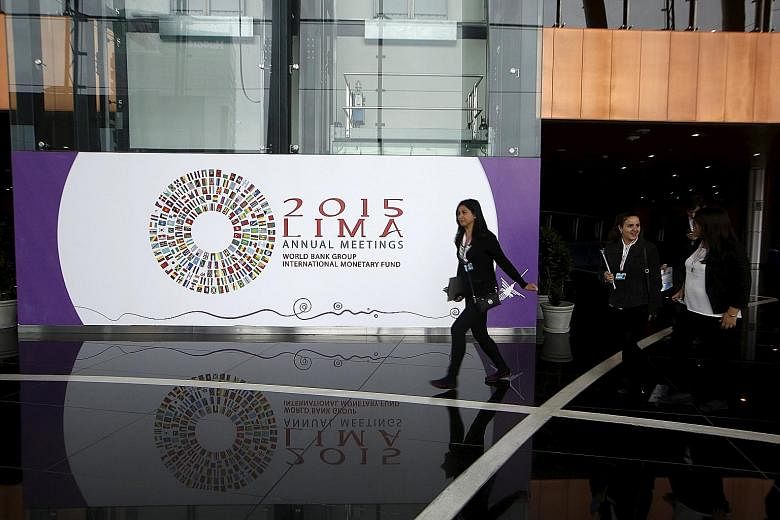LIMA • Emerging market companies have an estimated US$3 trillion (S$4.25 trillion) in overextended loans that threaten to trigger a sharp credit crunch and capital outflows in economies that have already been hit hard by low commodity prices, the International Monetary Fund said yesterday.
The IMF warned that a messy withdrawal of stimulus measures in advanced economies could start a "vicious cycle of fire sales, redemptions, and more volatility".
The US Federal Reserve has said it is on track to raise rates for the first time in almost a decade by the end of this year.
-
Tharman to attend IMF summit
-
SINGAPORE • Deputy Prime Minister Tharman Shanmugaratnam will head to Peru this week to attend the Lima summit of the International Monetary Fund.
As chairman of the Monetary Authority of Singapore (MAS), Mr Tharman will attend IMF meetings and those by its policy-steering committee, which will be held from today to Saturday. The meetings will discuss actions to build resilience amid a more uncertain global environment, MAS and the Ministry of Finance said in a joint statement yesterday.
Mr Tharman will be accompanied by officials from MAS and the Ministry of Finance.
The world's finance ministers and central bank governors are gathering in Lima for the annual meetings of the IMF and World Bank.
At the top of their agenda is how to respond to a cooling global recovery and concerns over a sharper economic slowdown in China and the risks to emerging economies.
Overborrowing in emerging market economies likely adds up to an average of 15 per cent of their gross domestic product, and 25 per cent of China's GDP, the IMF said.
Emerging markets where companies tapped easy credit to soften the impacts of the global financial crisis are now on the verge of a credit downturn, the IMF said. Many of the borrowers are state-owned enterprises and the lenders are often local banks. "Corporate and bank balance sheets are currently stretched," it said in its Global Financial Stability Report. "Immediate prudential attention is needed."
China's exposure to credit risks as it transitions to a more market-based economy is especially worrisome, the Fund said.
China's August stock market crash and sudden devaluation in August rattled global markets. "Direct financial spillovers include a possibly adverse impact on the asset quality of at least US$800 billion of cross-border bank exposures," the Fund said.
The IMF said China should improve access to its equity market to provide companies an alternative to bank financing.
It calculates that there is around US$1.5 trillion in embedded leverage in US bond funds through derivatives, which could unwind dramatically if the Fed's normalisation process provokes liquidity shocks.
Bankers, investors, as well as regulators from the Fed have expressed concerns about bouts of bond market volatility, particularly after a "flash crash" on Oct 15 last year.
Many market participants have blamed the volatility on crisis-inspired rules requiring more capital, less proprietary trading and stress tests that have reduced liquidity in markets.
The IMF's warning comes after years of near-zero interest rates and massive stimulus programmes in the United States and Europe that have failed to return growth to pre-crisis levels.
"Monetary policies in key advanced economies must remain accommodative and responsive," the IMF said.
It recommended the Federal Reserve hold off on raising rates until it sees additional signs that inflation is quickening. Subsequent hikes should be gradual and well-communicated.
The Federal Reserve has faced criticism for not providing more clarity on when it will raise interest rates, a hotly anticipated move that has caused volatility in emerging markets.
REUTERS

